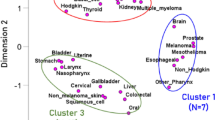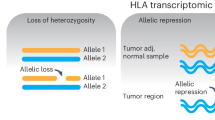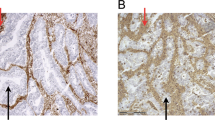Abstract
In an effort to understand whether HLA class I and II plays any role in the process of tumorigenesis and metastasis, we have immunohistochemically examined expression of HLA class I and II antigen by using the monoclonal antibodies (mAb) L368 (for β2m of HLA class I), HC-10 (for HLA-B, C heavy chains), and LGII-612.14 (for HLA class II heavy chain) in 5 borderline serous malignancy (BSM), 20 serous adenocarcinomas (SA), 15 borderline mucinous malignancy (BMM), and 10 mucinous adenocarcinomas (MA) of human ovary tumor case tissues. In BSM, the distribution and intensity of HLA expressions failed to reach statistical significance. In SA, HLA class I β2-µglobulin (β2m), HLA-B, C heavy chains and HLA class II heavy chain antigen expressions were down-regulated. Although expressions of HLA-B, C heavy chains and class II heavy chain were down-regulated in metastatic SA, there were no differences in HLA expression levels between primary and metastatic lesions. In BMM, class II heavy chain expressions were down-regulated. In MA, β2m, HLA-B, C heavy chains and class II heavy chain expressions were also down-regulated. Thus, we could distinguish the reduction or absence of HLA molecule expression was related to malignant potential. Loss of HLA class I and II molecules in invasive ovarian cancers raises the possibility that this could be a factor for tumor cells to retain invasiveness.
Similar content being viewed by others
Article PDF
Author information
Authors and Affiliations
Rights and permissions
This is an Open Access article distributed under the terms of the Creative Commons Attribution Non-Commercial License (http://creativecommons.org/licenses/by-nc/3.0/) which permits unrestricted non-commercial use, distribution, and reproduction in any medium, provided the original work is properly cited.
About this article
Cite this article
Lee, Y., Kim, T., Kim, B. et al. Alterations of HLA class I and class II antigen expressions in borderline, invasive and metastatic ovarian cancers. Exp Mol Med 34, 18–26 (2002). https://doi.org/10.1038/emm.2002.3
Published:
Issue date:
DOI: https://doi.org/10.1038/emm.2002.3
This article is cited by
-
Loss of LECT2 promotes ovarian cancer progression by inducing cancer invasiveness and facilitating an immunosuppressive environment
Oncogene (2024)
-
Reference Module-Based Analysis of Ovarian Cancer Transcriptome Identifies Important Modules and Potential Drugs
Biochemical Genetics (2022)
-
Direct tumor recognition by a human CD4+ T-cell subset potently mediates tumor growth inhibition and orchestrates anti-tumor immune responses
Scientific Reports (2015)
-
Correlation of HLA-A02* genotype and HLA class I antigen down-regulation with the prognosis of epithelial ovarian cancer
Cancer Immunology, Immunotherapy (2012)
-
Impact of the tumor microenvironment on host infiltrating cells and the efficacy of flt3-ligand combination immunotherapy evaluated in a treatment model of mouse prostate cancer
Cancer Immunology, Immunotherapy (2003)



